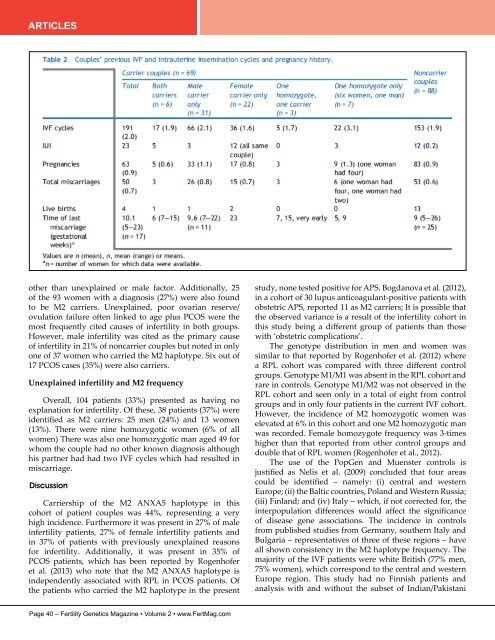FERTILITY GENETICS
TCqTZH
TCqTZH
Create successful ePaper yourself
Turn your PDF publications into a flip-book with our unique Google optimized e-Paper software.
ARTICLES<br />
other than unexplained or male factor. Additionally, 25<br />
of the 93 women with a diagnosis (27%) were also found<br />
to be M2 carriers. Unexplained, poor ovarian reserve/<br />
ovulation failure often linked to age plus PCOS were the<br />
most frequently cited causes of infertility in both groups.<br />
However, male infertility was cited as the primary cause<br />
of infertility in 21% of noncarrier couples but noted in only<br />
one of 37 women who carried the M2 haplotype. Six out of<br />
17 PCOS cases (35%) were also carriers.<br />
Unexplained infertility and M2 frequency<br />
Overall, 104 patients (33%) presented as having no<br />
explanation for infertility. Of these, 38 patients (37%) were<br />
identified as M2 carriers: 25 men (24%) and 13 women<br />
(13%). There were nine homozygotic women (6% of all<br />
women) There was also one homozygotic man aged 49 for<br />
whom the couple had no other known diagnosis although<br />
his partner had had two IVF cycles which had resulted in<br />
miscarriage.<br />
Discussion<br />
Carriership of the M2 ANXA5 haplotype in this<br />
cohort of patient couples was 44%, representing a very<br />
high incidence. Furthermore it was present in 27% of male<br />
infertility patients, 27% of female infertility patients and<br />
in 37% of patients with previously unexplained reasons<br />
for infertility. Additionally, it was present in 35% of<br />
PCOS patients, which has been reported by Rogenhofer<br />
et al. (2013) who note that the M2 ANXA5 haplotype is<br />
independently associated with RPL in PCOS patients. Of<br />
the patients who carried the M2 haplotype in the present<br />
study, none tested positive for APS. Bogdanova et al. (2012),<br />
in a cohort of 30 lupus anticoagulant-positive patients with<br />
obstetric APS, reported 11 as M2 carriers; It is possible that<br />
the observed variance is a result of the infertility cohort in<br />
this study being a different group of patients than those<br />
with ‘obstetric complications’.<br />
The genotype distribution in men and women was<br />
similar to that reported by Rogenhofer et al. (2012) where<br />
a RPL cohort was compared with three different control<br />
groups. Genotype M1/M1 was absent in the RPL cohort and<br />
rare in controls. Genotype M1/M2 was not observed in the<br />
RPL cohort and seen only in a total of eight from control<br />
groups and in only four patients in the current IVF cohort.<br />
However, the incidence of M2 homozygotic women was<br />
elevated at 6% in this cohort and one M2 homozygotic man<br />
was recorded. Female homozygote frequency was 3-times<br />
higher than that reported from other control groups and<br />
double that of RPL women (Rogenhofer et al., 2012).<br />
The use of the PopGen and Muenster controls is<br />
justified as Nelis et al. (2009) concluded that four areas<br />
could be identified – namely: (i) central and western<br />
Europe; (ii) the Baltic countries, Poland and Western Russia;<br />
(iii) Finland; and (iv) Italy – which, if not corrected for, the<br />
interpopulation differences would affect the significance<br />
of disease gene associations. The incidence in controls<br />
from published studies from Germany, southern Italy and<br />
Bulgaria – representatives of three of these regions – have<br />
all shown consistency in the M2 haplotype frequency. The<br />
majority of the IVF patients were white British (77% men,<br />
75% women), which correspond to the central and western<br />
Europe region. This study had no Finnish patients and<br />
analysis with and without the subset of Indian/Pakistani<br />
Page 40 – Fertility Genetics Magazine • Volume 2 • www.FertMag.com


